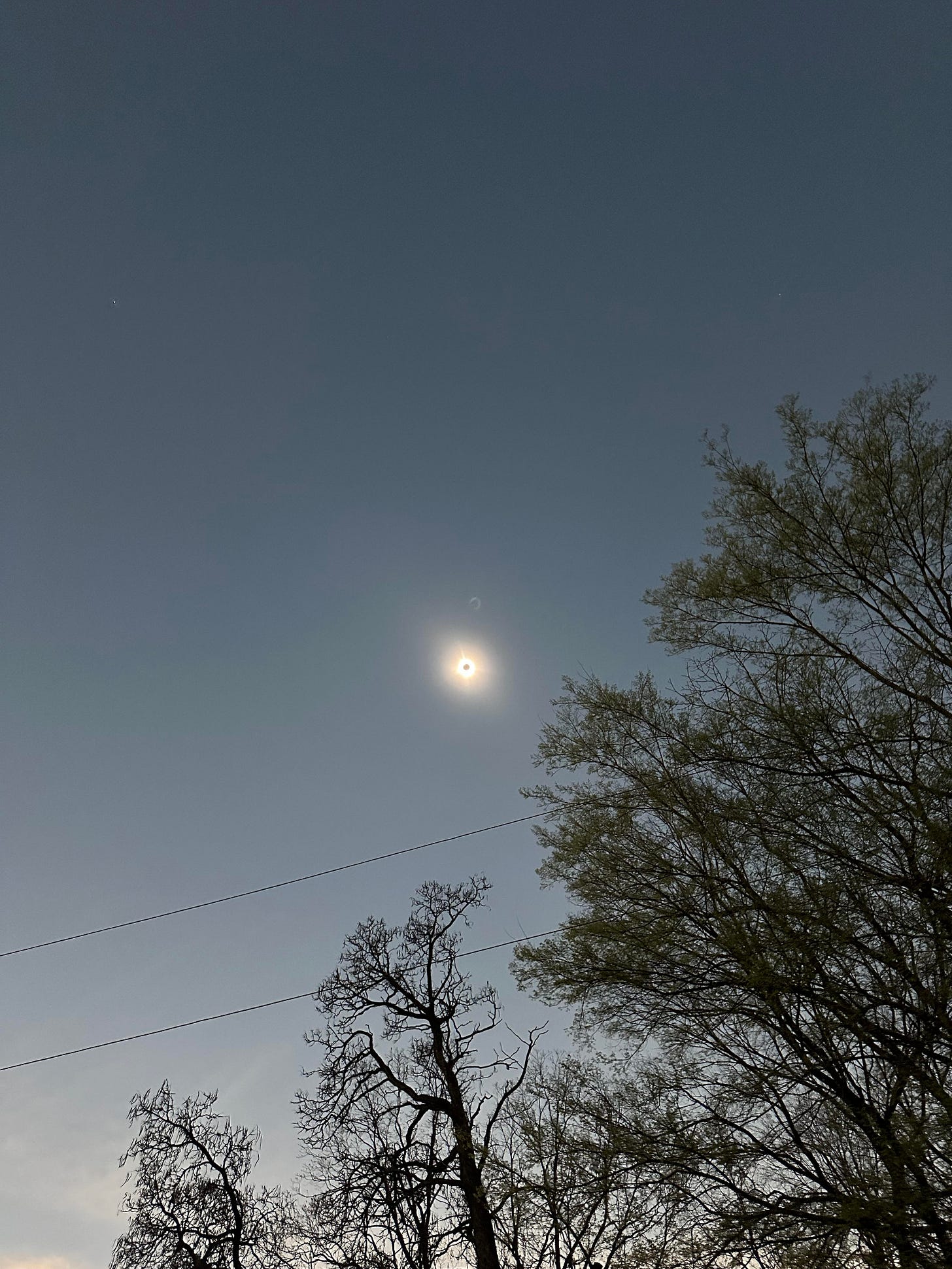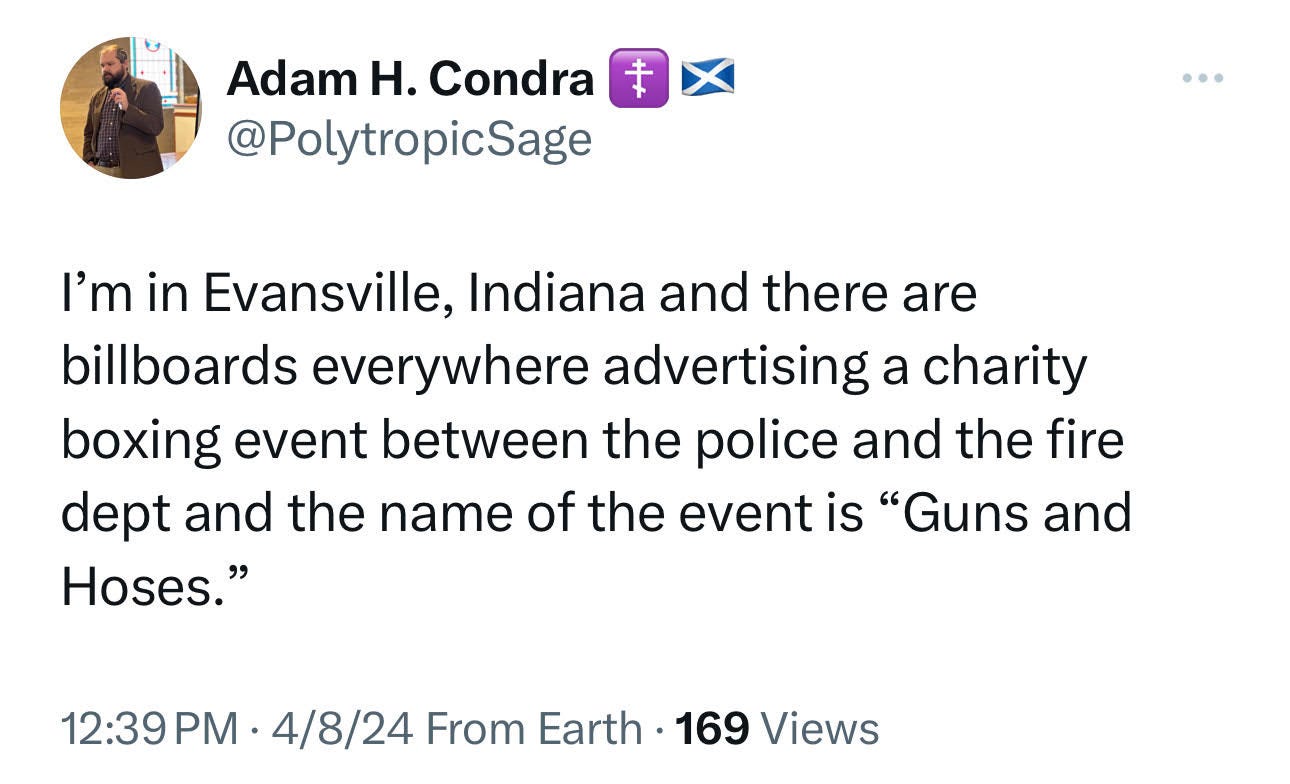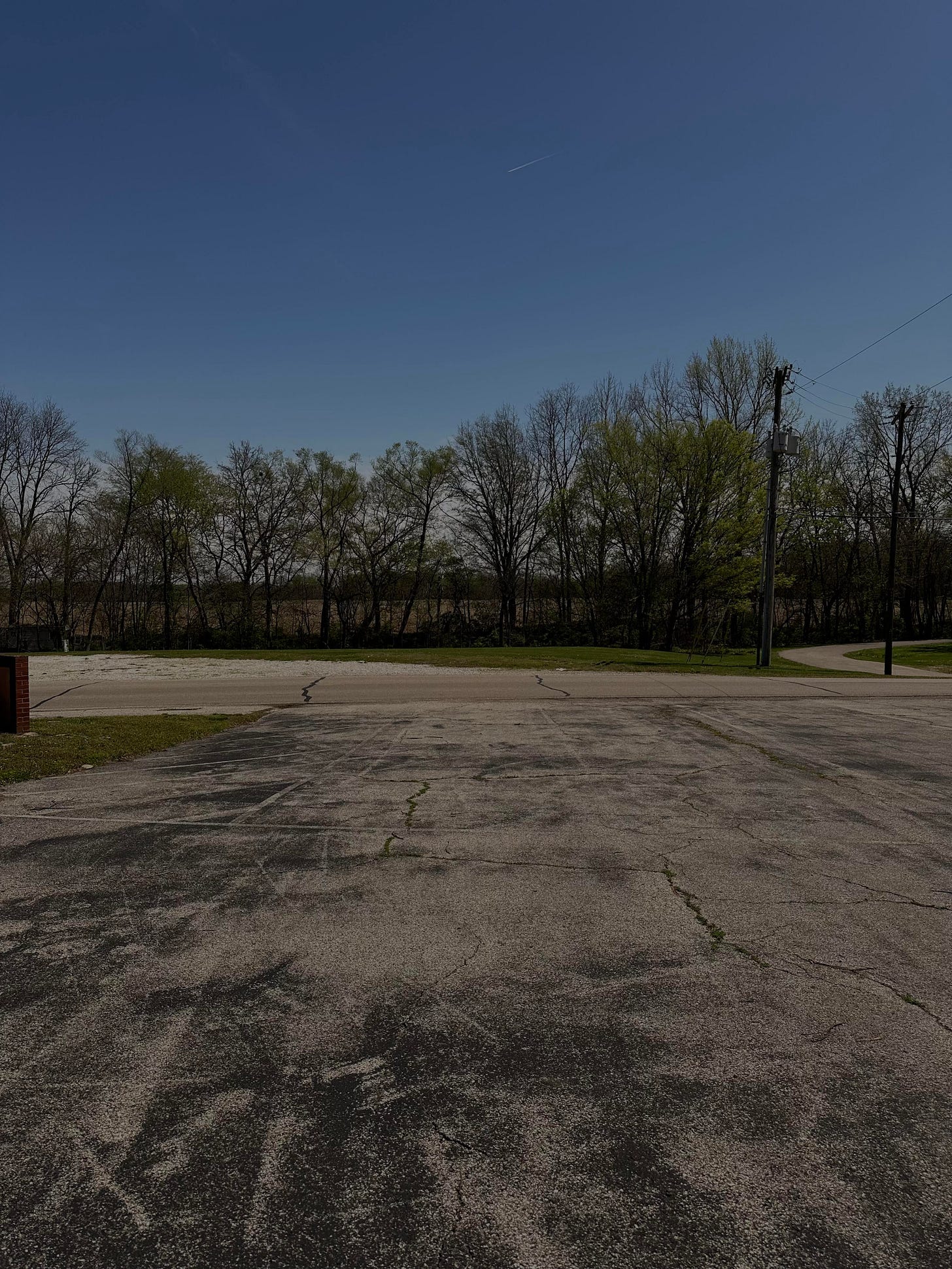Frankly, The Eclipse Was Not Hyped *Enough*
If you're asking me, and why else are we here?
The Internet was customarily abuzz this weekend on the subject of this year’s solar eclipse, visible across Mexico and the United States. Part of that custom’s attendance involves the usual pooh-poohing of such an event, the most entertaining of which came from American poet Charles Barkley: “Were y’all some of them losers standing outside watching [the eclipse] today? […] Yes they are [losers]! Hey, we’ve all seen darkness before, stop it.”
As an Alabamian, I’m honor bound not to speak ill of Sir Charles, nor would I ever want to, but in truth, he and everyone else who cast aspersions on traveling to see the eclipse’s totality are speaking from their hind parts (that’s no insult to Barkley, he has made such his patronage for decades). The eclipse was one of the most astonishing and delightful things I’ve ever seen, and I have no choice but to commemorate it in prose.
By now I’m sure we’re all familiar with the mathematical realities that make the eclipse what it is to earth. Eclipses are commonplace among the celestial bodies of space, but only on our planet are there two bodies of proper size and distance to allow for the appearance of a corona that can be observed with the naked eye. Likewise, for the moment, I will spare you my unique brand of evangelism about what this implies about the origins of existence, because I’m sure you can guess what I have to say about that.
No, the first thing I will say is that I feel a profound sense of gratitude that I had an opportunity to travel and see it. I had little interest in doing so, until a friend who had visited the totality in 2017 advised me that seeing it in person is one of those ineffable experiences that can’t be fully translated through words and pictures, which is the surest way to coax me out of indifference. A few of our science teachers at my school had put a trip together, and the original chaperone asked me to go in her place.
So, I didn’t really know what to expect, nor was I just burning with anticipation, but I thought, “Well, I want to know, and it’s not happening again for us for 20 years.” The idea that this easily could have passed me by is now much heavier than it was last week.
On Sunday, our party drove to Bowling Green and selected Gage, Kentucky as our intended viewing point. The next morning, a crash on the highway diverted us north, ending up in Evansville, Indiana, a place only too happy to force you to reckon with its particular charm:
Luckily, we arrived with enough time to seek out a bit more isolation, and passed on to a town called Wadesville, where the anxiety about missing out on anything finally forced us into the empty parking lot of a tiny church.
Now, I had seen the eclipse in 2017, where my city received about 90% totality, easily observed through glasses but still bright enough to be blinding. I was prepared for the odd dimming and the crescent shadows and slight drop in temperature. What I wasn’t prepared for was how animated the world becomes when the eclipse starts to happen. Maybe that’s because I saw the previous one in a large crowd and this time we were alone in small town America, but the local wildlife soon made it very clear that they were upset by the change in schedule.
Birds of every stripe started calling each other, crickets and bugs began to wake up, dogs were barking, and it carried a kind of jumbled, panicked tone, as if they had all just learned that a king or a beloved celebrity was dropping by unannounced for breakfast. The birds in particular seemed seriously agitated, swarming to settle in trees and chasing out lesser birds who had arrived in comfortable branches first. The air was thick with the feeling that us mere humans were not nearly worried enough about what was about to happen.
The higher percentage of coverage also brought an alarming change in color. I remembered how things had gotten dim the last time, but this was different. The color slowly drained out of everything, desaturated like an old photograph, but in the sky the light was still piercing and, let’s say, “un-countenance-able.” It’s a jarring dissonance, sort of the opposite of the way the lightsabers in Lucas’s Star Wars movies are made of light but don’t emit it. Darkness was settling in everywhere, but it was still impossible to see why.
And then the corona hits, and, forgive my change in tense, this is where things get ineffable. In a moment of plain shock, that dissonance is ripped, not out of, but into, the sky, and you see the dissonance’s origin in pure, stark detail. It hangs there, and everything goes silent. For the first time in my life, I was staring at the sun by natural means. My awe was struck, my gob was smacked, and it was… huge. Seriously, I can’t convey to you just how big the sun is when you can finally look at it just sitting there in the sky.
The corona is beautiful. No picture, not the one at the top of this post and not the one captured with our most advanced cameras by our most dramatically skilled photographers can convey how beautiful it is. The only thing I really knew for sure while looking at it was that A) this was the work of God, and B) I was staring at a paradox. Pro forma, I now turn my language over to Saint Gilbert, patron of paradoxes:
“The one created thing which we cannot look at is the one thing in the light of which we look at everything. Like the sun at noonday, mysticism explains everything else by the blaze of its own victorious invisibility.”
The eclipse is a gift, a brief window into which we’re permitted to see the unseeable as if it were any other object. This is a privilege the sun will never know, because while it’s a creation of God, and perhaps His most powerful creation, it’s not one of His children. I felt humbled, sure, but I did not feel small. I did not feel insignificant, or alone, or helpless, or any of the other putatively humble nihilisms that our pop-science overlords like Tyson and Nye direct us to express when confronted by the Almighty.
Instead, I felt like a child, an inheritor. I felt like I was being allowed to, and I return to this word intentionally, countenance a thing I could not safely reach for myself, like when I take a bauble off a shelf so my daughter can inspect it. Chesterton goes on to say of the moon:
“Detached intellectualism is (in the exact sense of a popular phrase) all moonshine; for it is light without heat, and it is secondary light, reflected from a dead world. But the Greeks were right when they made Apollo the god both of imagination and of sanity; for he was both the patron of poetry and the patron of healing. Of necessary dogmas and a special creed I shall speak later. But that transcendentalism by which all men live has primarily much the position of the sun in the sky. We are conscious of it as of a kind of splendid confusion; it is something both shining and shapeless, at once a blaze and a blur. But the circle of the moon is as clear and unmistakable, as recurrent and inevitable, as the circle of Euclid on a blackboard. For the moon is utterly reasonable; and the moon is the mother of lunatics and has given to them all her name.” -Orthodoxy, 1908
The role that the moon fulfills in this display is one of rigid lunacy. Its shape and patterns and mathematical realities all connected in those brief three minutes or so to give me a glimpse of something that was startlingly, invigoratingly real, but cannot be accurately conveyed or shared with you or indeed anyone else. My memory is the only place I know that can recall the truth of it, the poetic understanding. She made me a madman.
All I could think about driving away from the totality was what I needed to do in order to see the next one; to share the experience with my wife and family. Twenty-one years is a long time, and though I’m relatively young and in fair health, there’s no guarantee that I will be there. I thought about my diet, I thought about my drinking habits, my exercise habits, my spiritual habits, my general emotional state, asking myself what needed to change in order to improve my odds of survival- all the variables of life that I still possess a small measure of control over. The eclipse has compelled me to interrogate and account for these things. I feel driven now to take my life in a firmer grip so that I can share this vision with the people I care most about.
For you, dear reader, I offer a different charge. Obviously, if you’ve been to a totality, then you get it, and I’m mildly (but pleasantly!) bemused that you’ve read this far. But if you haven’t traveled to view an eclipse, if you haven’t seen the corona, I encourage you not to wait. The next ten years are already mapped out. Save your money, pick a time and place, and travel to the next one. Go to Spain in 2026, or Egypt in 2027, or Sydney in 2028. Remove America from the matter, because God offers this gift regularly to the world of His creating, and we live in a time where we can avail ourselves of it. I exhort you to do so. I want us to share this madness.
May our Lord illuminate the righteous path He has laid before each of us and compel us to walk it dutifully and with joy.




